Picture this. You’re out riding on a beautiful trail in a state forest with a small group of family and friends. A group of riders pass you on the trail intently reading a map and a compass and whispering something about finding a paper plate.

Linda Byer riding Gusty (left), Stacy Kimmel on Remmy (center) and Laura Vanmeter riding Image are all smiles as they ride back toward camp during the CMO at Kingdom Prairie in Northwestern Indiana. Photo by Allen MacMillan/MacMillan Photography
CMO is short for competitive mounted orienteering, which is essentially a road rally on horseback where you search a natural area to find hidden treasure (in this case, paper plates with codes written on them which are called “objective stations”) by using the trail map with printed instructions on the back and a compass. You navigate the old-fashioned way by taking compass readings off of landmarks; no GPS or cell phone navigation is permitted. The landmark descriptions are listed on the back of the map and help to determine the location of the objective stations by narrowing the search area where several compass coordinates intersect.

The CMO clues on the back of the map indicate the compass readings to be taken at various landmarks. Either two or three landmarks are used to help pinpoint where the objective stations are hidden. Photo by Allen MacMillan/MacMillan Photography
Once you locate an objective station, you record the station number and the two-letter code and ride date on the back of your map and then go looking for your next objective. The individual rider or team of two to six riders to locate all of the objective stations and then cross the finish line in the least amount of time wins. You can locate the stations in any order and ride as fast or slow as you wish. The plates are supposed to be visible from the saddle, so hopping on and off your horse is not usually necessary.
I first learned about CMOs from Kristi Crowe. Crowe lives in Valparaiso in Northwest Indiana, and went to her first CMO at the invitation of one of her fellow Porter County Sheriff’s Posse members.
“It was a lot of fun,” says Crowe. “I rode with an experienced team and learned the ins and outs while on the trail. The landmarks are up to the ride manager’s discretion and are generally a very creative description of a natural object. One of my most memorable landmarks was the ‘Octopus Tree’. That sounds like a very unique tree, but when you are out cantering on a trail, there tend to be a lot of trees matching that description!
“My horse when I first started CMOs was an Appaloosa/Thoroughbred mare named Dancer. She absolutely loved the sport. She relished in the race and especially the trip to the finish! Since then I have also competed my Trakehner mare Risa in CMOs.”

Kyle Volk and his trusty Haflinger JC at the Kingdom Prairie CMO Photo by Allen MacMillan/MacMillan Photography
Anyone can participate on any kind of equid, and they can be ridden or driven (although if you plan on driving your horse check with the Ride Manager first.) The equipment you need is minimal: a simple orienteering compass and a marker that you wear on a lanyard; comfortable tack and riding clothes, and a good trail horse that is at least three years old. Competition entry fees are generally around $5 for juniors and $10 for adults with a $5 fee for riders who are not members of the National Association of Competitive Mounted Orienteering (NACMO).
Prizes are awarded after each ride and year-end and there are lifetime awards for cumulative points through the NACMO and the regional clubs.
“Competitive Mounted Orienteering was first envisioned as a sport in 1981 by Cliff Pladsen in Olgivie, Minnesota, as a game to play with his family while trail riding to improve their map and compass skills,” says NACMO President Marti Caldwell. “He developed rules and the NACMO came into being in 1983. There are now active chapters with a ride season of at least five rides per year in Minnesota/Wisconsin, Indiana/Illinois, Michigan, the Northeast (New York, Pennsylvania and New Jersey), Eastern Washington/Idaho, Alabama and a new chapter just starting up in Kentucky.”

Three generations of ladies from the same family are ready with maps in hand to leave the CMO base camp: Kathy Haas riding her Arabian, Hershey, and her daughter Kristin Price and granddaughter Daniella riding double on Amber, a Morgan cross. Photo by Allen MacMillan/MacMillan Photography
Another great aspect of competitive mounted orienteering is that it is family-friendly.
“Our family moved to Minnesota in 1986,” says Caldwell. “My daughter and I attended a ‘fun’ ride put on by the CMO chapter for our 4-H Club there in 1987. We were immediately hooked. She was 12 at the time and we had just bought three horses. My husband started riding with us a year or so later and we stopped getting lost so often! We found the sport attracted people who became wonderful friends. These folks were true horse enthusiasts who could handle a fair amount of frustration and didn’t need an expensive prize to prove they had had a good time. We started the Indiana/Illinois chapter when we moved to Northwest Indiana in 1991, primarily as a way to meet more great people. Our kids are grown now, but still join us for CMO rides. Our daughter met her husband through our sport. Our son, who doesn’t ride much anymore, still comes to events to enjoy the great friends we have all made.”
CMO riders form a community and help each other often. “We have an award every year to recognize a person who has gone out of their way to help other riders with problems – flat tires, broken equipment, loose horses, forgotten ingredients for dinner – whatever,” says Caldwell.
Even though any breed may participate, Crowe pointed out some desirable characteristics in a good CMO horse.
“It must be a good trail horse,” she says. “It is helpful if your horse doesn’t mind being separated from others as you get your compass readings and search for the plates. If you are in it to try to win, a horse that likes to run is necessary.”

The riders receive the maps marked with the objective stations just as they start their CMO ride. Pat Mouw and her Arabian gelding Ty competed as individuals at the Kingdom Prairie CMO. Mouw has accumulated over 2,500 lifetime points in CMOs so far. Photo by Kristin Crowe/MacMillan Photography
Since most CMOs are held over two days with a separate competition on Saturday and Sunday, many choose to camp overnight. The camaraderie of pitch-in dinners and sharing stories from the day’s ride around a camp fire are part of the fun.
Finally, bring your poker face and keep your lips sealed when competing in a CMO. You do not want to help opposing teams find the plates by making a lot of noise when you find one. Strategy is a big part of the sport. You need to plan a route to find the objectives and split up the tasks of taking compass readings, looking for landmarks, reading the map and marking down the codes.
“Competitive mounted orienteering may be the only sport where lying is encouraged,” laughs Caldwell, “You have to be careful not to tip off other teams when you find the objectives, so fibbing is part of the game.”
If you’re looking for a break from the show ring or to jazz up your trail riding, consider entering a CMO near you. The sport is becoming known across the country with new chapters just established in Kentucky and Alabama.
“We’re spreading it around,” says Kingdom Prairie Ride Co-Manager Svenja Chesna, “Every time someone moves they start a new chapter. That’s how this one started 20 years ago.”
For more information on CMOs visit www.nacmo.org.
A big thank you to Kingdom Prairie CMO Ride Co-Manager Danielle Popovich for her help in preparing this story

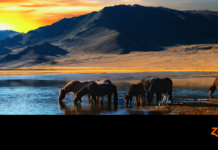
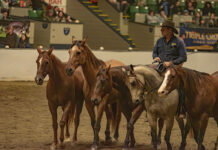
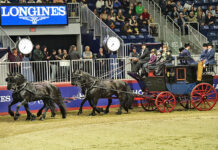
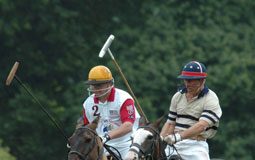
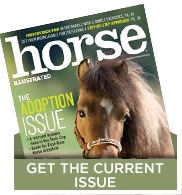
that sounds like so much fun!
Do you have any riders in the New Hampshire area? I would love to have a guest speaker at my riding club meeting. We all trail ride and love fun things.
Thanks to Janice Elsishans, who introduced CMOs to NJ, we have been riding in CMOs since the 1990s. I say “riding”, not “competing” since we don’t care who wins as long as we enjoy the day. That said, we have been NJ State Champions in the past. NJ doesn’t have many overnight camping places, so our CMOs are one day rides.
Did you know that NJ is the most densely populated state in the USA for people AND horses? That means we have more people and horses per square mile than any other state!
Since many of our CMOs are held over state or local parklands, we do not “run” as the western folks do, in deference to the other park users. If you see a CMO listed near you- come on out and try it. It is inexpensive and fun!
Hey Kelly – thanks for your interest. Please message me through the NACMO web site (www.nacmo.org) or through our FB page (NACMO) and we’ll try to find you a speaker! Marti Caldwell, NACMO president
Where would I find info on cmo in NJ?
Where would I find info on cmo in NJ?